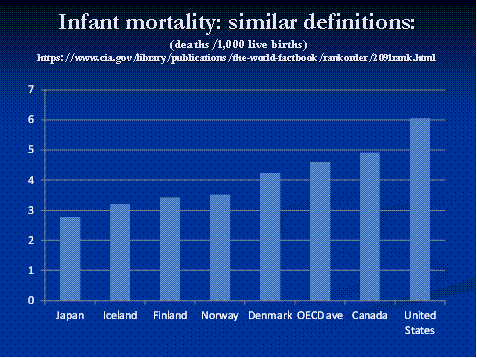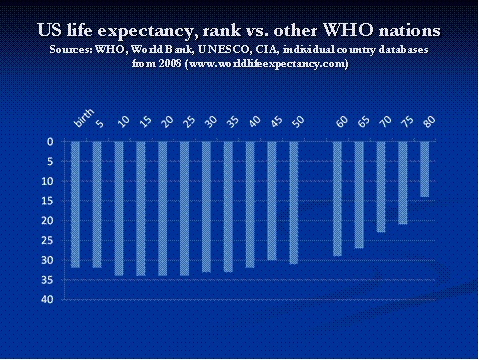Reference Materials
US life expectancy and
infant mortality vs. the industrialized World
Author: Samuel Metz
Date: 08/07/2012
I received this E-mail after participating in a
panel discussion hosted by Warren Olney on his program, "To the Point"
on NPR affiliate KCRW in Los Angeles ("Healthcare Reform: Should Obama
Have Fought for Single-Payer?"). [You can listen to the broadcast here.]
The writer brought up important
points regarding America's public health ranking against other
countries. Here is the E-mail followed by my response.
Greetings Dr. Metz:
I listened with interest to your commentary on "To the
Point" this morning. I was particularly intrigued by your claim
that the health system in every country achieves better outcomes at
lower costs than the system in the US.
Is this based on studies that directly compare the costs and
clinical efficacy of treating equally sick people with specific
diseases? E.g. international comparisons of clinical efficacy. If so -
please share them here on your site. If it is not based on studies
that directly compare how effectively doctors and hospitals treat
patients, then please share the data that you have based these claims
upon.
Life expectancy and infant mortality statistics, while commonly
cited in support of such claims, are confounded by real factors
(murders, accidents, risk-factor prevalence, etc) and registration
artifacts (vastly different standard for determining what constitutes
a live birth and recording it as such) that vary dramatically from one
country to the next. Consequently - they are very unreliable
indicators of clinical efficacy.
If either constitutes the basis for your critiques of health system
performance in the US, I hope that you will, at a minimum - acquaint
yourself with the literature that outlines their limitations for this
purpose.
My reply:
Thank you for listening critically to the NPR broadcast, "To the
Point," on October 3rd and specifically to my comments. I will do
my best to respond.
Data demonstrating our public health rank near or at the bottom of
industrialized countries come from multiple sources. They all concur
regarding our dismal results [1-6].
Correcting our health care statistics for smoking, obesity, traffic
fatalities, race, and homicides makes no perceptible difference in our
relative ranking [7].
Some of the criteria stand on their own without requiring correction
for equally sick patients with comparable diseases. These include
maternal mortality [8,9], foot amputations per 100,000 diabetics
[10],
and lives lost to treatable diseases
[11].
The clinical efficacy aspect to which you refer compares clinical
outcomes for patients receiving treatment. This presumes citizens
receive treatment. This is mostly true in other industrialized nations
but unfortunately not in the US. A participant on the broadcast, Dr.
Schoen, is co-author on one article documenting compromised access to
health care in the US [12,13].
Compromised access, not provider ineptitude, is the principal factor
responsible for our poor health [14,15]. Once Americans get through the
door of a hospital or physician's office, their care compares well to
other countries. Unfortunately only relatively wealthy Americans have
sufficient money to get through those doors. The 44% of Americans who do
not receive health care in a timely manner or, in some cases, at all,
make our overall statistics poor [13].
Some statistics show longer survival rates in the US for certain
kinds of cancer. These conflict with other statistics, confounding the
claim [16]. Additionally, similar mortality rates for these cancers
suggest differences (if any) are attributable to earlier diagnosis
rather than longer life expectancy
[17,18].
You are correct that differences in the definition of "live
birth" affects statistics on infant mortality and life expectancy
at birth. Here is a statement from the OECD (italics in the original):
"Some of the international variation in infant mortality rates
is due to variations in registering practices of premature infants
(whether they are reported as live births or not). In the United States,
Canada and the Nordic countries, very premature babies (with relatively
low odds of survival) are registered as live births, which
increases
mortality rates compared with other countries that do not register them
as live births." [19]
Correcting for this different definition does not improve our rank.
"The United States has … the highest infant mortality rate among
the eight countries that report this metric similarly." (Canada,
Denmark, Finland, Iceland, Japan, Norway, Sweden, and the United States
[20,21]).
This is presented in a graph with data from the CIA
[20]:

Some contend American neonatologists make humanitarian (and usually
futile) efforts to save premature or underweight neonates, efforts not
made in other countries. If so, we expect a lower life expectancy at
birth than these other countries. This is true. However, after these
desperately ill neonates die young, we expect a rise in comparative life
expectancy at ages five years and above. We do not see this. The
relative life expectancy ranking of the US compared to other countries
does not change at any age (until age 65, suggesting an effect of
Medicare on health care access).
This is presented in graph form below [22]:

You are not alone in suggesting our health care must be better than
statistics indicate. Many Congressional leaders make similar statements
[23-30]. As these members of Congress are in the top 10% income bracket,
it is unlikely they encounter the access failures plaguing Americans in
lower income brackets. They also have political agendas served by
publicizing their unsubstantiated beliefs.
If you have additional studies that should be included, as your last
paragraph suggests, please share the citations and I will include them
in future discussions.
References
1. Organization for Economic Cooperation and Development (OECD)
Health at a Glance
Health Statistics
2. Preker AS. The introduction of universal access to health care in
the OECD: lessons for developing countries. In: Achieving Universal
Coverage of Health Care. Nitagyarumphong ES, Mills A (editors). Ministry
of public health, Bangkok, 1998, p.103
3. The Central Intelligence Agency (CIA). The World Factbook.
www.cia.gov/library/publications/the-world-factbook
4. The World Health Organization (WHO)
Selected indicators of health expenditure ratios, 1999-2003.World Health
Report 2006.
www.who.int/whr/2006/annex/06_annex2_en.pdf
www.who.int/whr/2006/annex/06_annex2_en.pdf
www.who.int/research/en
www.who.int/whr/2000/annex/en/index.html
www.who.int/whr/2000/en/annex01_en.pdf
www.who.int/whr/000en/report.htm
5. The Commonwealth Fund [links no
longer valid]
Nolte E, McKee CM.. Measuring the health of nations: updating an earlier
analysis. Health Affairs, Jan/Feb 2008, p. 71
Schoen C, Davis K, How SKH, Schoenbaum SC. US health system performance:
A national scorecard. Health Affairs Web exclusive, November/December
2006; 25(6): w457-w475,
6. The Kaiser Family Foundation.
www.globalhealthfacts.org/bytopic.jsp
7. Muennig PA, Sherry A. Glied SA. What changes in survival rates
tell us about US health care. Health Affairs 2010;29, no.11:2105-2113.
doi: 10.1377/hlthaff.2010.0073
8. Hogan MC, Foreman KJ, Naghavi M, Ahn SY, Wang M, Makela SM, Lopez
AD, Lozano R, Murray CJL, Maternal mortality for 181 countries,
1980-2008: A systematic analysis of progress towards Millennium
Development Goal 5. The Lancet. 2010;375(9726):1609-23.
www.who.int/pmnch/topics/maternal/20100402_ihmearticle.pdf
9. Deadly Delivery: The Maternal Health Care Crisis in the USA.
Amnesty International, March 2010. Index: AMR 51/019/2010.
(link no longer valid)
10.
Health at a Glance 2009: OECD Indicator
11. Wilper AP, Woolhandler S, Lasser KE, McCormick D, Bor DH,
Himmelstein DU. Health insurance and mortality in US adults. Am J Public
Health 2009;99:2289-2295
www.ncpa.org/pdfs/2009_harvard_health_study.pdf
12. Schoen C, Doty MM, Robertson RH, Collins SR. Affordable Care Act
reforms could reduce the number of underinsured US adults by 70 percent.
Health Affairs, 2011;30, no.9:1762-1771.
www.latimes.com/health/la-fi-health-insurance-20110908,0,343767.story
13. Consumer Reports. Health Insurance Survey Reveals 1 in 4 People
Insured But Not Adequately Covered, ConsumerReports.org, September 2007.
September 12, 2007,
(link no longer valid)
14. [link no longer
valid]
15. Mark Pearson, Head Health Division, OECD, Written statement to
Senate Special Committee on Aging, 30 September 2009. Disparities in
health expenditures across OECD countries: Why does the United States
spend so much more than other countries?
www.oecdwash.org/PDFILES/Pearson_Testimony_30Sept2009.pdf
16. Paul Krugman. Cancer Survival. New York Times, March 24, 2011.
krugman.blogs.nytimes.com/2011/03/24/cancer-survival
17. Aaron Carroll. Senator Johnson's odd dislike of the PPACA. The
Incidental Economist. March 23, 2011
theincidentaleconomist.com/wordpress/senator-johnsons-odd-dislike-of-the-ppaca
18. Aaron Carroll. Survival rates are not the same as mortality
rates. The Incidental Economist August 31, 2010.
theincidentaleconomist.com/wordpress/survival-rates-are-not-the-same-as-mortality-rates
19. OECD Health Data 2005.
www.oecd.org/dataoecd/15/23/34970246.pdf
20.
CIA Library Article
21. Congressional Research Service, Peterson CL, Burton, R. U.S.
Health Care Spending: Comparison with Other OECD Countries. 9-17-2007
22. WHO, World Bank, UNESCO, CIA, individual country databases from
2008.
www.worldlifeexpectancy.com
23.
"We need to recognize that the finest health-care system in the world is
at risk-and repeal ObamaCare before it's too late." Sen. Ron Johnson
(R-Wisc)
24.
www.washingtonpost.com/wp-dyn/content/article/2010/02/25/AR2010022504325.html
"I do believe we have the best health care system in the
world." Sen. John Barrasso (R-Wyo)
25.
www.nytimes.com/2009/11/05/opinion/05kristof.html
Sen. Richard Shelby (R-Ala). President Obama's plans amount to "the
first step in destroying the best health care system the world has ever
known."
26. www.mdmagazine.com/forum/general-medicine/45
(link no longer valid)
Sen. Rand Paul (R-Ky) "The debate should start by acknowledging
that we have the greatest health care in the world, and that 100% of
people in the country have 100% access to emergency care. Those things
are sort of lost on people when they talk about the uninsured. Everybody
in our country can receive medical care."
27.
Senate Minority Leader Mitch McConnell (R-Ky), "We do start with the
notion, however, that we have the best health care in the world,"
(link no longer valid)
28.
www.issues2000.org/2008/John_McCain_Health_Care.htm
Sen. John McCain (R-Ariz) "The real question is: How are we going
to keep health care costs down, because we have the highest quality of
health care in the world in America today?"
29.
www.ontheissues.org/2008/Fred_Thompson_Health_Care.htm
former Senator Fred Thompson (R-Tenn) "Americans have the best
healthcare in the world."
30. Rep.
Michele Bachmann (R-Minn) "Let's not destroy the greatest health
care system the world has ever known."
(link no longer valid)